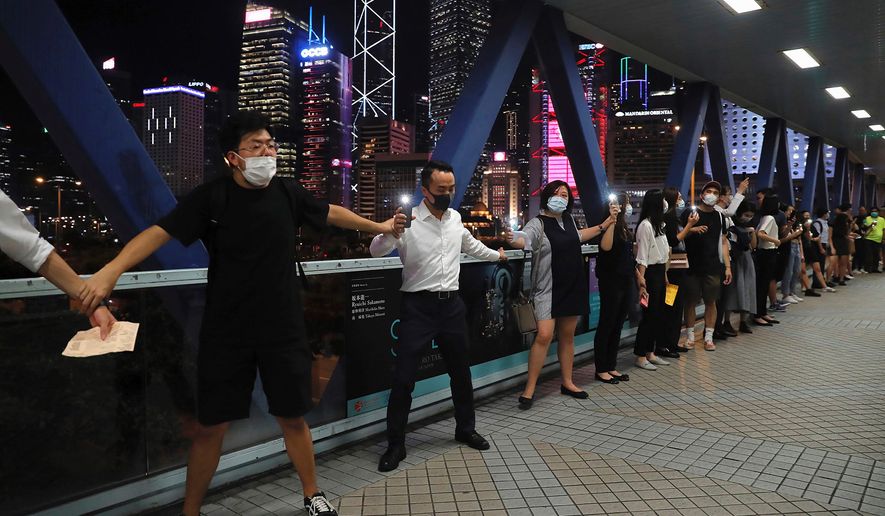OPINION:
Few Americans today remember what is known as “Black Ribbon Day,” when more than 2 million people in Communist Latvia, Estonia and Lithuania joined hands in an unbroken human chain that stretched some 420 miles to protest the Soviet occupation of the three countries pursuant to a secret 1939 agreement between Nazi Germany and the Soviet Union.
The protest took place on the 50th anniversary of the signing of the infamous Hitler-Stalin pact on Aug. 23, 1939, which made the two totalitarian states allies and included secret protocols that, among other things, provided Nazi support for the Soviet Union’s desire to occupy and annex the Baltic States. Although the protocols had become public during the Nuremburg Trials following World War II, Moscow officially denied their existence even as the men and women of the three nations joined hands to protest the deal and demand their freedom.
It was 1989, Mikhail Gorbachev was in power in Moscow and the peoples that had been forced into the Soviet empire were growing restive. The foundations of the Soviet empire were crumbling and nationalist independence movements in the Baltic States sought a way to dramatize their yearning for freedom and independence. They picked Aug. 23 on the advice of a young Canadian, because by shining a light on the perfidy of Adolf Hitler and Joseph Stalin no one would be able to dismiss their protest as a “right wing” reaction to the Communist rulers installed in their countries by Moscow.
The fact that 2 million of the 8 million people living in the three countries joined the chain grabbed the world’s attention and scared the heck out of the Kremlin, whose leaders saw things in the Baltic unravelling before their eyes.
Mr. Gorbachev may have wanted the West to see his country in a new light, but the Kremlin’s message to the protesters was blunt and to the point: “Matters have gone far. There is a serious threat to the fate of the Baltic peoples. People should know the abyss into which they are being pushed by their nationalistic leaders. Should they achieve their goals, the possible consequences could be catastrophic to these nations. A question could arise as to their very existence.”
Amid visions of the Soviet intervention in Hungary and Czechoslovakia, the people of Latvia, Estonia and Lithuania stood firm, Britain and the United States warned Moscow to resist an invasion, and ultimately they prevailed. Within a few short months, the Kremlin finally acknowledged the existence of the secret 1939 protocols and not long afterward the Baltic States won their freedom and independence. The United Nations and the United States declared Black Ribbon Day a day of remembrance that would stand as an example to people everywhere struggling against totalitarianism.
Although few in America remember that day in 1989, the people of Hong Kong certainly do and on Aug. 23 of this year in honor of the courage of those who joined hands in the Baltics 30 years ago, they formed a chain that extended 30 miles across Hong Kong to protest Beijing’s trampling on their freedom and the independence they were guaranteed when the British left them to the tender mercies of the Communist regime on the mainland.
In forming their own Hong Kong chain, the hundreds of thousands of Hong Kong residents who joined hands last month were no doubt hoping not just to honor what happened in the Baltics 30 years before, but to accomplish what they had accomplished. The world is already focused on what’s going on in Hong Kong, but there is a difference between the regime they are fighting and the Kremlin of the late ’80s, and the difference makes one wonder whether their struggle will end as successfully as they hope.
Mr. Gorbachev and his cronies may have blustered and threatened in 1989, but they had to know that the heyday of Soviet power was long gone and that the empire they headed was doomed. The day when they could simply send in the troops to crush their subjects was gone and as the world focused on the Baltic Chain they blinked … and simply gave up.
The Communist Chinese regime finds itself in a very different situation. Their empire is on the ascendency and they’ve shown little real regard for world opinion as they’ve crushed internal opposition in ways that were possible in the Soviet Union under Joseph Stalin, but not Mikhail Gorbachev. They aren’t likely to blink or surrender and whether the Hong Kong protesters know it or not they will need all the courage they can muster to continue the struggle in which they are engaged.
• David A. Keene is an editor at large for The Washington Times.




Please read our comment policy before commenting.